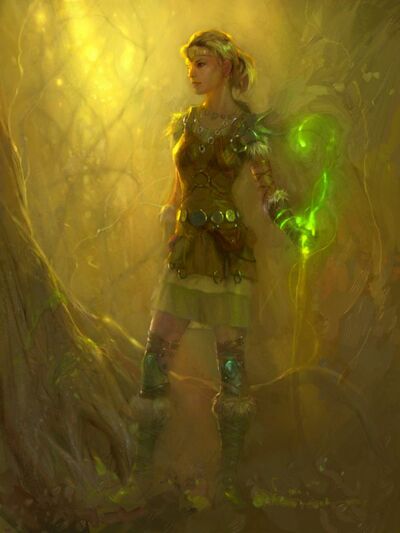Shaman

Like a Warlord, but less cool and more primitive. Basically, you chant and wardance buffs onto other PCs, while summoning animal spirits.The primary advantage of the Shaman is the very clunky and somewhat broken summoned animal, which is nearly impossible for monsters to destroy. Additionally, the healing mechanic for the shaman gets around the 'use a surge to heal' paradigm, which breaks an important aspect of the game.
A solitary class they feel no need to seek adventure instead spending their time improving their skills. They usually get pulled into trouble anyway due to their usefulness. They are most commonly known for their wide use of the elements and not to be mistaken for Druids. If they feel the need they will use totems, usually hung around the neck or wrist, to help channel their power.
One of the most popular things Shamans are known for is their ability to summon various creatures. What a shaman can summon depends on his dedication to the art and luck. Most creatures summoned by the average shaman will look half put together and often gruesome adding on a small fear factor the otherwise smaller and less intimidating shaman. Occasionally you'll run into a more accomplished one who can summon all sorts of things, if it doesn't look like it'll kill you, run.
In group mechanics shamans are most likely used for their buffing and healing abilities. The buffs shamans have to offer span everything the elements touch from boosts to resistances. While their healing abilities aren't top of the line it's hard to argue against someone who can also summon a creature that will eat you.
| Dungeons & Dragons 4th Edition Classes | ||
|---|---|---|
| Player's Handbook 1 | Cleric • Fighter • Paladin • Ranger • Rogue • Warlock • Warlord • Wizard | |
| Player's Handbook 2 | Avenger • Barbarian • Bard • Druid • Invoker • Shaman • Sorcerer • Warden | |
| Player's Handbook 3 | Ardent • Battlemind • Monk • Psion • Runepriest • Seeker | |
| Heroes of X | Blackguard* • Binder* • Cavalier* • Elementalist* • Hexblade* • Hunter* • Mage* • Knight* • Protector* • Scout* • Sentinel* • Skald* • Slayer* • Sha'ir* • Thief* • Vampire* • Warpriest* • Witch* | |
| Settings Book | Artificer • Bladesinger* • Swordmage | |
| Dragon Magazine | Assassin | |
| Others | Paragon Path • Epic Destiny | |
| *·: Non-AEDU variant classes | ||